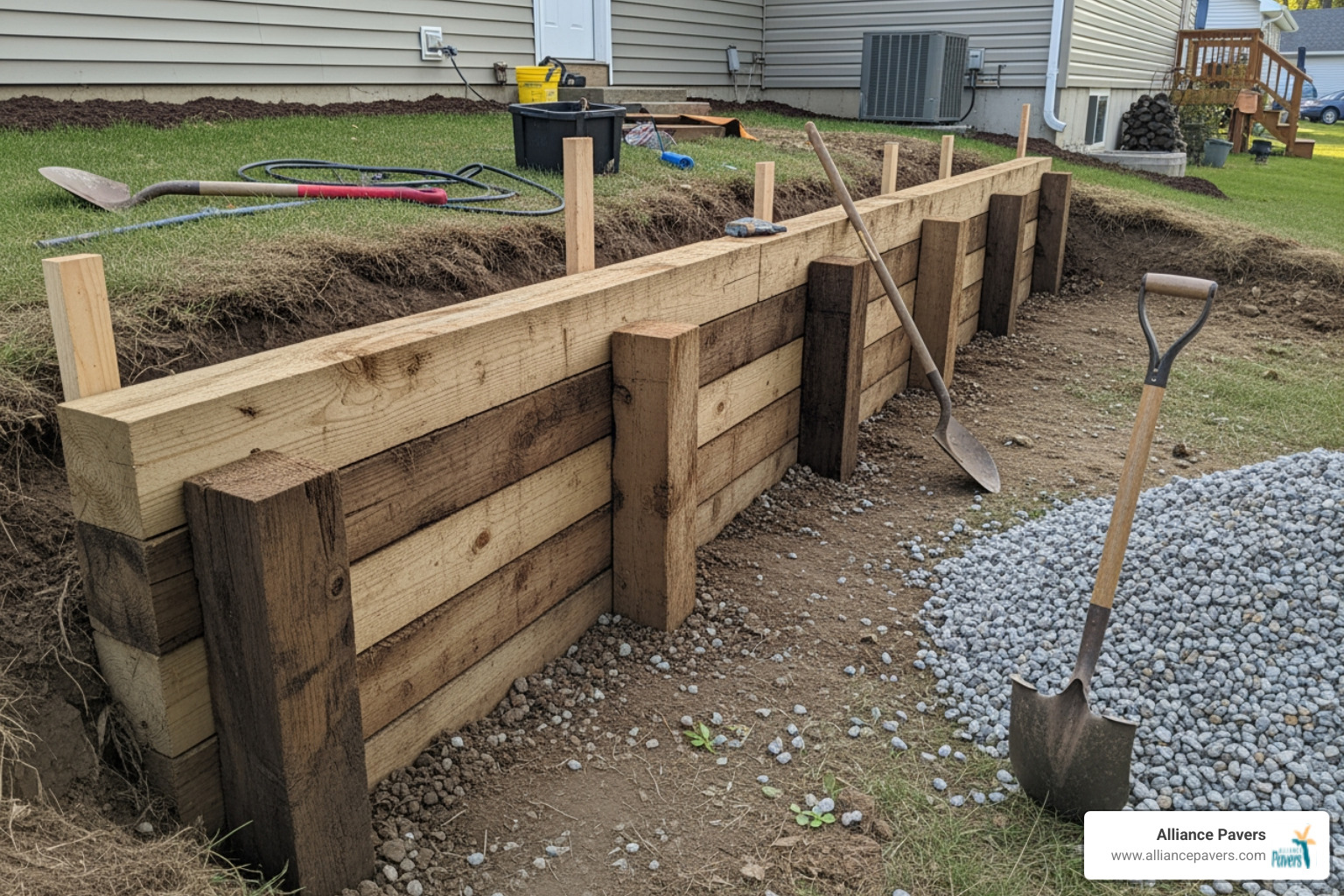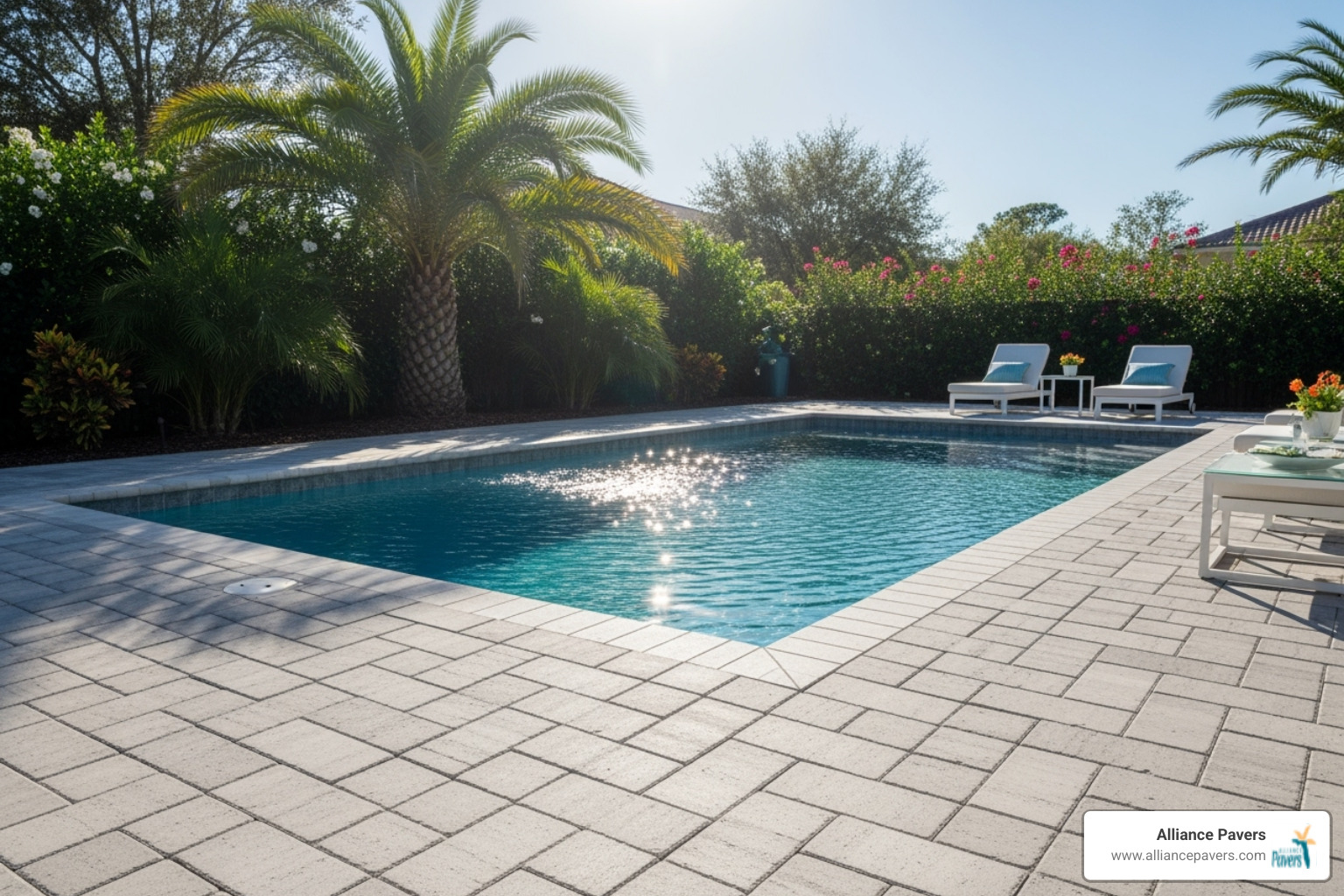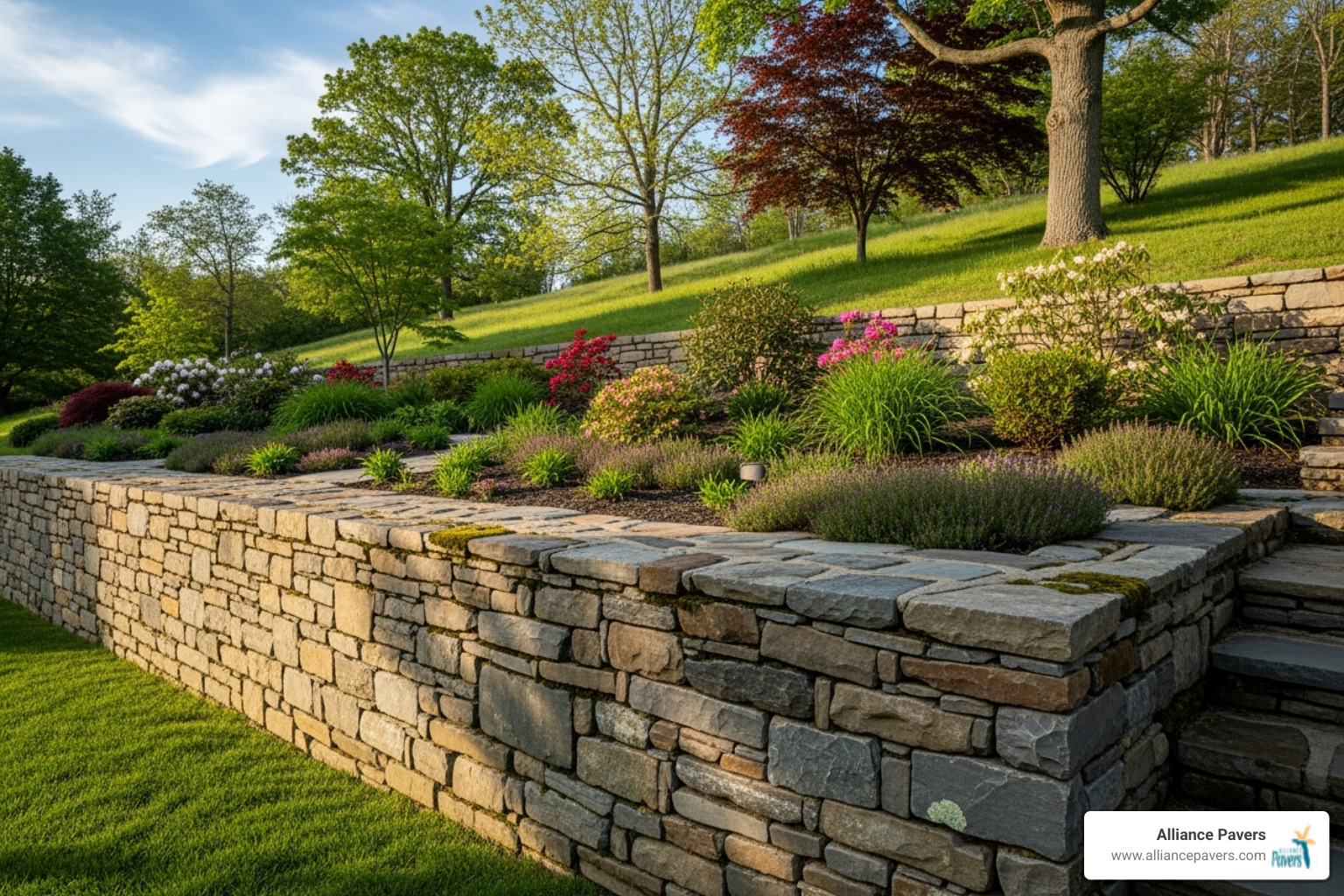The Ultimate Guide to Paver Patio Maintenance: Keep Your Outdoor Oasis Looking New
Keep your paver patio pristine! Learn ultimate paver patio maintenance tips for cleaning, sealing, and repair.
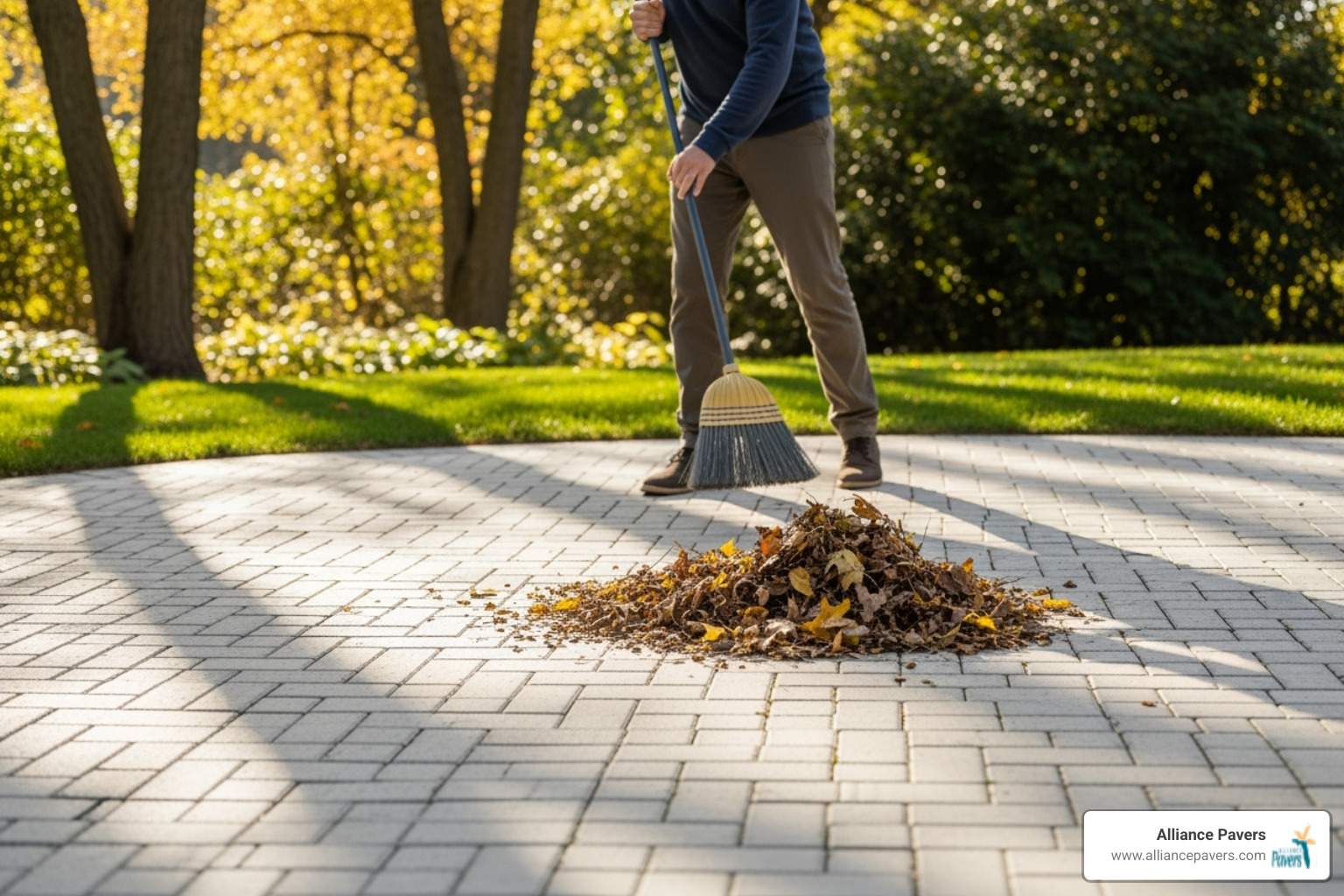
Why Your Paver Patio Deserves Better Care
Paver patio maintenance is the key to keeping your outdoor space beautiful, safe, and valuable. A paver patio is a significant investment in your home, but without proper care, it can lose its luster, develop structural issues, and become a safety hazard.
Essential Paver Patio Maintenance Tasks:
- Weekly: Sweep debris and leaves
- Monthly: Rinse with a garden hose to prevent buildup
- Bi-annually: Deep clean with a mild detergent and stiff brush
- Every 3-5 years: Reseal pavers for protection
- As needed: Remove weeds, repair damaged pavers, and refresh joint sand
Maintaining your paver patio doesn't have to be overwhelming. With consistent, simple care routines, you can prevent most common problems before they start. Regular sweeping prevents staining, monthly rinsing keeps surfaces from becoming slippery, and addressing small issues promptly—like pulling weeds or replacing a cracked paver—saves you from expensive repairs down the road.
Your paver patio can last for generations with the right maintenance. Pavers are incredibly durable when cared for, often outlasting traditional concrete. However, like any outdoor surface exposed to Florida's sun, rain, and daily use, your pavers need regular attention to maintain their beauty and structural integrity.
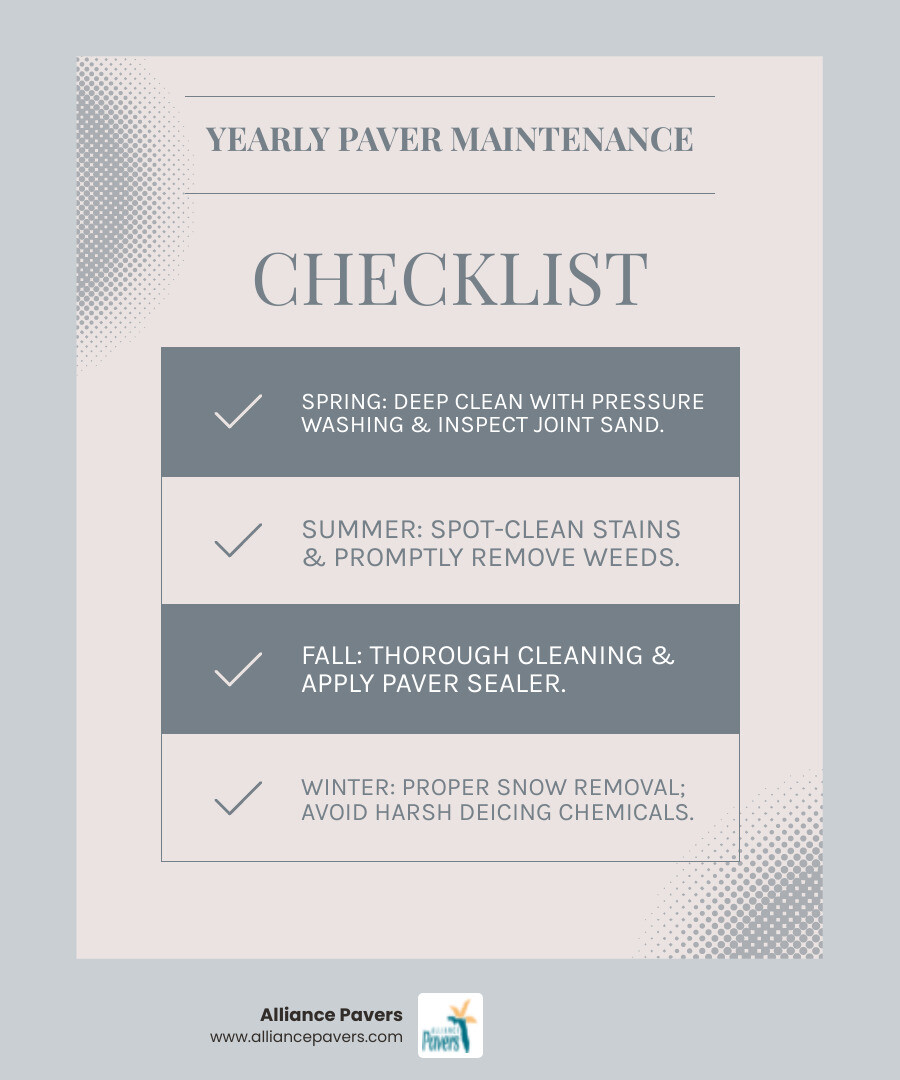
The Foundation of Paver Care: Regular Cleaning Routines
Your paver patio maintenance journey starts with regular cleaning. This is your first line of defense against the dirt, leaves, and grime that can accumulate on your patio.
Whether your patio features natural stone, classic brick, or durable concrete pavers, they all look their best when clean. Fortunately, you don't need fancy equipment or expensive products to keep your outdoor space looking amazing.
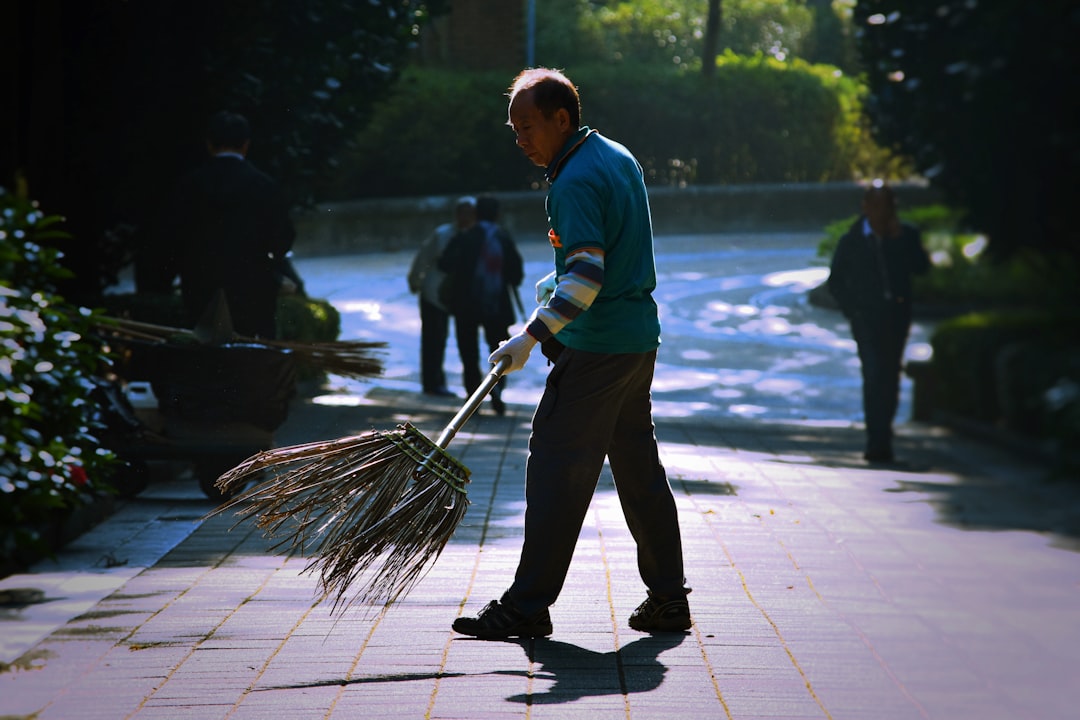
Weekly and Monthly Cleaning
Sweeping once a week prevents debris from settling between your pavers, which can cause stains and encourage weed growth. A sturdy broom works perfectly, but a leaf blower can clear your patio in minutes. Consistency is key—it's much easier to sweep away fresh debris than to scrub built-up grime later.
Monthly rinsing with your garden hose washes away fine dirt particles your broom might miss and helps prevent slippery surfaces from moss or algae. Use a gentle spray to avoid blasting away the important sand between your pavers.
For specific guidance on caring for different paver materials, check out our detailed guide on How to Clean Brick Pavers and Keep Them Looking New.
Deep Cleaning Your Pavers
Twice a year, your patio needs a deep clean to tackle stubborn dirt. For this, use a stiff-bristle brush and a mild detergent, like a simple mixture of dish soap and warm water. For tougher spots with moss or mold, a paver-specific cleaner can help, but always follow the product instructions.
Power washing can be effective if used carefully. Use low PSI settings (around 1200-1500 PSI) and a wide-angle nozzle. Keep the nozzle moving at a safe distance from the pavers. High pressure can damage the paver surface or wash out the joint sand. Always test your pressure washer on a small, hidden area first. Avoid wire brushes, as they can scratch pavers and leave rust marks. You can find more on avoiding wire brushes in our comprehensive cleaning resources.
Common Cleaning Mistakes to Avoid
Even with the best intentions, it's easy to make mistakes that can damage your patio. Here are common ones to avoid:
- Harsh chemicals: Bleach, ammonia, and acidic cleaners can strip color from your pavers or etch their surface. Natural stone pavers are especially vulnerable.
- High-pressure damage: Overzealous power washing can erode your paver surface, create uneven textures, or wash away joint sand. Understanding why you should never pressure wash certain things highlights why a gentle approach is better.
- Sealing a wet patio: Never seal damp surfaces. Trapped moisture leads to cloudy spots, white marks, or peeling finishes. Wait 24-48 hours after cleaning to ensure your pavers are completely dry.
- Ignoring small issues: A single weed or a small stain can become a big problem if left alone. A few minutes of attention today can save you hours of work later.
Tackling Common Paver Problems: Weeds, Stains, and Moss
Even well-maintained patios face challenges like weeds, stains, and moss. These issues can compromise your patio's beauty and structural integrity if left unchecked. Fortunately, with the right approach, you can manage these common culprits and keep your patio looking pristine.
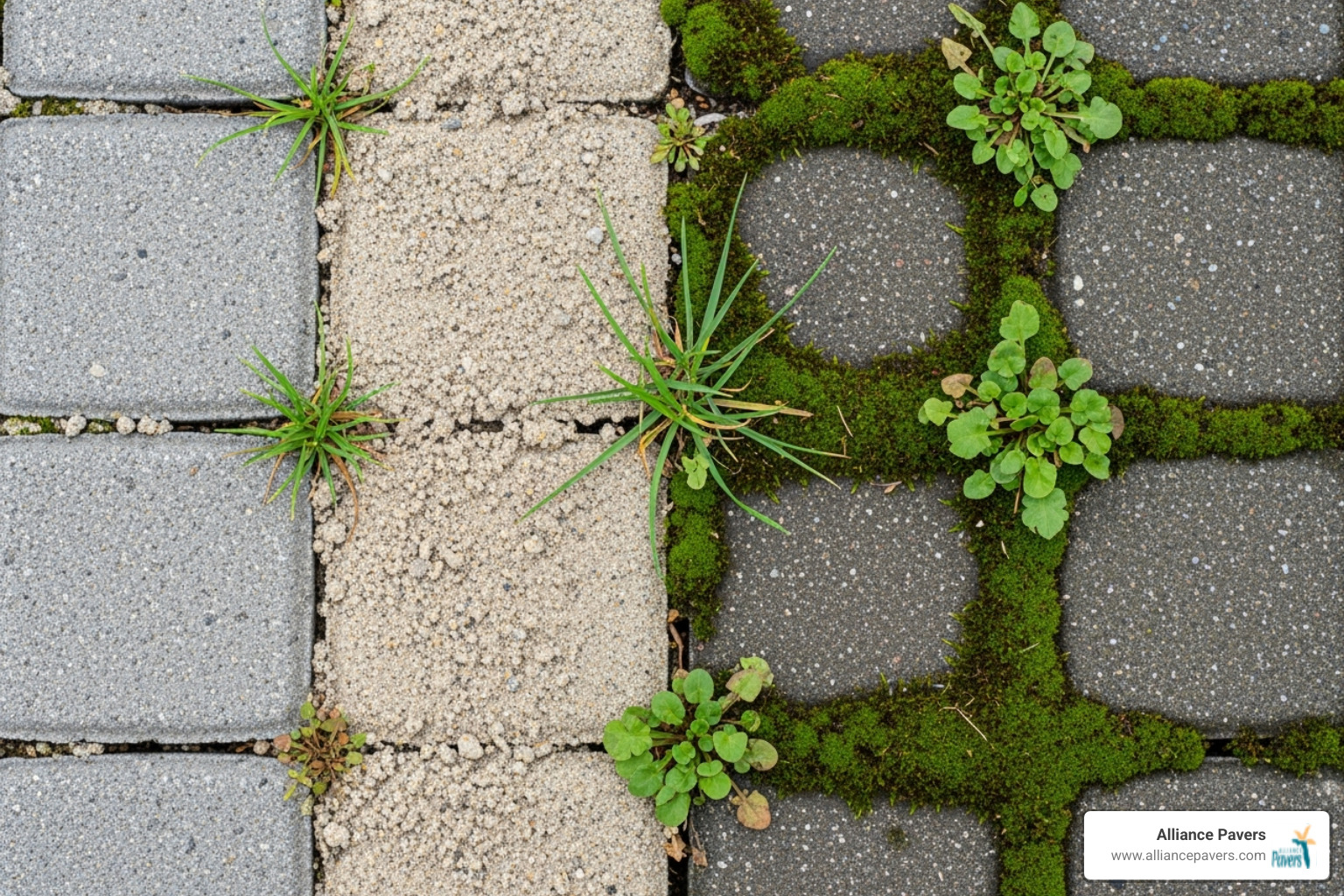
How to Effectively Remove Weeds and Moss
Weeds sprouting between pavers often indicate that your joint sand is low or moisture is lingering. If left alone, their roots can grow and cause pavers to shift.
Manual removal is your most reliable method. Walk your patio weekly, pulling emerging weeds by hand or with a weeding tool. A stiff brush also works well for dislodging smaller weeds before they establish deep roots.
For a natural approach, try a vinegar solution. Mix equal parts white vinegar and water, apply it directly to the weeds, and let it sit for an hour before rinsing. This method is safe for pets but test it on a hidden area first, as vinegar can slightly lighten some paver colors.
Moss thrives in damp, shaded areas and creates slippery, hazardous patches. To prevent moss, control moisture and shade. Trim overhanging branches to increase sunlight and ensure proper drainage so water doesn't pool. Addressing these root causes will significantly reduce both weed and moss problems. For more detailed tips for removing weeds and moss, our cleaning guide has you covered.
Removing Stubborn Stains from Your Patio
Stains are a part of outdoor living. The secret to successful removal is acting quickly and using the right method for each type of stain.
- Oil and grease stains: These are common around grills. Immediately cover the spill with an absorbent material like sand or baking soda. Let it sit for several hours to soak up the oil, then sweep it away. Scrub the area with a paver-safe degreaser or a strong mixture of dish soap and water, then rinse thoroughly.
- Rust stains: These often come from metal furniture or iron-rich fertilizers. Use a masonry cleaner designed for rust removal on stone. Always pre-wet the paver before applying the cleaner to minimize absorption, and rinse completely when finished.
- Organic stains: Leaves, berries, or mold are common in Florida's climate. For mold and mildew, a 1:1 vinegar and water solution works well when scrubbed onto the area. This gentle treatment also works for most leaf and berry stains. Ensure good drainage and regularly remove organic debris to prevent them.
Prompt action is crucial. The longer a stain sits, the harder it is to remove. Always test any cleaning solution on a small, hidden area first. For comprehensive guidance, see our article on Removing Tough Stains from Pavers Sanford.
Advanced Paver Protection: Joint Sand, Sealing, and Repairs
Beyond basic cleaning, advanced paver patio maintenance steps protect your investment for the long term. These proactive measures maintain the structural integrity that keeps your patio safe and functional through Florida's weather and daily use.
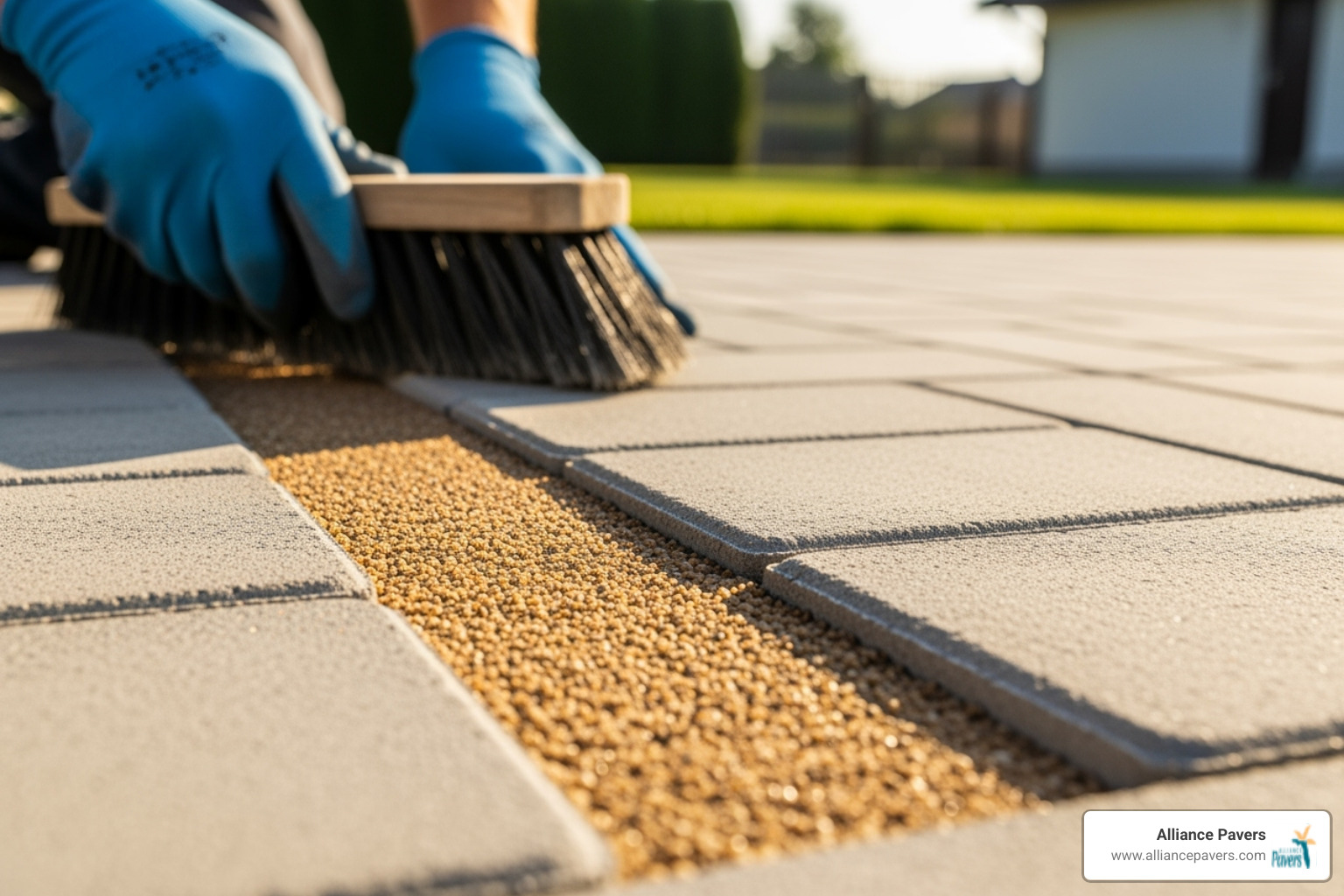
The Critical Role of Joint Sand
The sand between your pavers is essential for stability. Without proper joint sand, your patio can become wobbly and weed-infested.
Paver stabilization is the primary job of joint sand. It locks pavers in place, allowing them to distribute weight evenly. If the sand is lost, pavers can rock or shift, creating trip hazards. Modern polymeric sand contains additives that cause it to harden when wet, creating a strong barrier against weeds and acting as an insect deterrent. Ants find it much harder to burrow through hardened polymeric sand.
Check your joint sand levels every few months, especially after heavy rain or deep cleaning. To refresh it, clean the patio thoroughly, then sweep fresh polymeric sand into the joints until they are full. Lightly mist the sand with water to activate the binding agents. For detailed instructions, this guide on how to apply joint sand is a great resource.
A Guide to Sealing Your Paver Patio
While not mandatory, sealing your pavers is a highly recommended step that offers significant benefits.
- Stain Protection: A quality sealer creates a protective barrier, preventing spills from penetrating the paver surface and allowing for easy cleanup.
- UV Protection: Especially important in Florida, a sealer protects pavers from fading and color degradation caused by the sun.
- Color Improvement: Sealers can enrich the natural colors of your pavers, making them look more vibrant. Some create an appealing "wet look."
- Easier Cleaning: The smoother, less porous surface makes it harder for dirt to adhere, simplifying regular maintenance.
For new installations, wait 1-3 months before the first sealing to allow any natural efflorescence to emerge. After that, reapply sealer every 3-5 years, depending on traffic and weather exposure. The patio must be completely clean and dry (wait 24-48 hours after washing) before application to avoid a cloudy finish. Different types are available, including water-based sealers that offer a natural look. Our guide on How to Seal Paver Driveway covers the process in detail.
How to Handle Minor Paver Repairs
One major advantage of paver systems is that you can repair a single problem area. Identifying damage early is key. During maintenance, look for rocking pavers, cracks, or uneven surfaces.
For cracked or damaged pavers, replacement is the best solution. Carefully remove the damaged paver with a flat pry bar, taking care not to damage its neighbors. Clean out the old sand and debris from the empty space.
Next, level the base. Add or remove sand as needed to create a perfectly level surface for the new paver. Use a rubber mallet to gently tap the replacement paver into place, ensuring it sits flush with the surrounding stones.
Finally, sweep fresh joint sand into all the surrounding gaps. If using polymeric sand, activate it with a light mist of water. For step-by-step guidance, see our articles on How to Fix a Loose Paver and general Paver Repair. While minor repairs are DIY-friendly, call professionals for complex issues like widespread settling or drainage problems.
Seasonal and Preventative Paver Maintenance
Smart paver patio maintenance involves adapting your routine to the seasons. Florida's climate—with its intense sun, heavy rains, and cool winters—requires a year-round approach to keep your outdoor space protected. Planning your maintenance seasonally helps you stay ahead of potential problems. Our guide on Year-Round Paver Care for Doctor Phillips offers detailed insights for Florida homeowners.
Preparing Your Paver Patio for Winter
Even in Florida, winter prep is important. Cooler months bring moisture and ideal conditions for mold and moss. Start with a thorough fall cleaning to remove all leaves, pine needles, and organic debris. When these materials decompose on your pavers, they can cause stains and encourage mold growth.
Fall is also the ideal time for a deep clean and a fresh sealer application if you're due. A sealer will help shed moisture and prevent staining from winter's humidity.
On the rare occasion of a frost, use plastic shovels or snow blowers—never metal tools that can scratch or chip pavers. Use deicing chemicals sparingly, as excessive use can accelerate wear over time. For guidance on the cautious use of deicing chemicals, expert resources can help you make safe choices.
DIY vs. Professional Paver Maintenance
Many paver patio maintenance tasks are perfect for DIY, but knowing when to call professionals can save you time and money.
Maintenance AspectDIY ApproachProfessional ServiceScope of WorkWeekly sweeping, monthly rinsing, spot cleaning stains, pulling weeds, replacing single paversLarge-scale deep cleaning, extensive stain removal, full patio sealing, major repairs, structural levelingTools RequiredBasic broom, garden hose, stiff brush, mild detergents, hand weeding toolsCommercial pressure washers, specialized cleaning solutions, professional sealers, compaction equipmentTime InvestmentOngoing maintenance fits into weekend routinesEfficient completion by experienced crewsWhen to ChooseRegular upkeep, minor issues, preventative careComplex problems, large projects, when you want guaranteed results
Routine tasks like sweeping, rinsing, and spot-cleaning are well within reach for most homeowners and help you spot problems early. However, some situations call for professional expertise. If you're dealing with extensive moss, deeply embedded stains, or multiple shifted pavers, it's time to call in the experts. Large-scale sealing also benefits from professional application to ensure an even, long-lasting finish. It's often more cost-effective to have complex issues handled by professionals to prevent them from becoming bigger problems.
Frequently Asked Questions about Paver Patio Maintenance
As a company with 25 years of experience serving homeowners in St. Cloud and throughout Florida, we've answered many questions about paver care. Here are some of the most common ones.
How often should I clean my paver patio?
Consistency is more important than intensity. We recommend the following schedule:
- Weekly Sweeping: This prevents the buildup of leaves, dirt, and debris that can lead to stains and weeds.
- Monthly Rinsing: A gentle rinse with a garden hose washes away fine particles and helps prevent slippery algae or moss, which thrive in Florida's humidity.
- Deep Cleaning (1-2 times per year): In spring and fall, use a stiff brush and mild detergent to deep clean your patio. High-traffic or shaded areas may benefit from the twice-yearly approach.
Successful paver patio maintenance is about routine care, not waiting for problems to appear.
Is sealing my paver patio necessary?
While not mandatory, sealing is highly recommended for protecting your investment and enhancing its longevity. Sealing provides several key benefits:
- Stain Protection: Sealed pavers resist stains from spills like barbecue sauce, oil, or wine, making cleanup easy.
- UV Protection: In Florida's intense sun, a quality sealer acts like sunscreen for your patio, preventing the paver colors from fading.
- Easier Cleaning: A sealed surface is less porous, so dirt doesn't embed as deeply, making your regular maintenance more effective.
Sealing extends your paver patio's lifespan and keeps it looking vibrant for years longer. For help choosing a product, our article on Professional vs. Store-Bought Paver Sealers can guide you.
What's the best way to stop weeds from growing between pavers?
Preventing weeds is much easier than removing an established infestation. Here are the most effective strategies:
- Use Polymeric Joint Sand: Your first and best defense is keeping paver joints filled with quality polymeric sand. When activated with water, it hardens into a solid barrier that weeds struggle to penetrate.
- Apply a Joint Stabilizing Sealer: These specialized sealers not only protect the paver surface but also lock joint sand in place, making it even harder for weeds, mold, and mildew to establish.
- Perform Regular Inspections: Check your patio every few weeks for low sand levels or new weed growth. Catching problems early allows for a quick fix.
- Ensure Proper Drainage: Weeds love moisture. If you have persistent weed problems in one area, improving drainage can often solve the issue for good.
Keep Your Patio Perfect for Years to Come
Your paver patio is a treasured gathering place for family and friends. With thoughtful paver patio maintenance, this outdoor sanctuary can remain a source of pride and joy for generations.
Consistent care makes all the difference. Weekly sweeping, bi-annual deep cleaning, and proactive steps like refreshing joint sand or applying a sealer are investments in the future enjoyment of your outdoor space. By being proactive about small issues, you can prevent bigger headaches down the road.
Of course, life gets busy, and some issues require a professional eye. For complex problems like significant settling, stubborn efflorescence, or large-scale repairs, trusting a professional ensures the job is done right.
As a family-owned business with 25 years of experience in St. Cloud, FL, we understand that your patio is a significant part of your home. We are committed to exceptional craftsmanship and providing a stress-free experience for every homeowner we serve.
Whether you handle maintenance yourself or need expert help with larger tasks, preserving the beauty and safety of your paver patio is always worth the effort. When you need professional assistance, we're here to help. Contact us for expert paver repair services in St. Cloud, FL, and let's keep your outdoor space looking spectacular.


